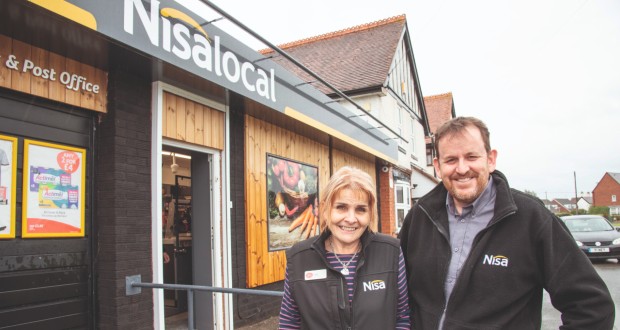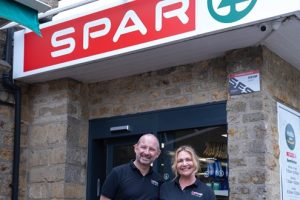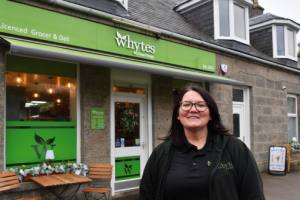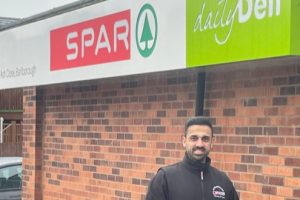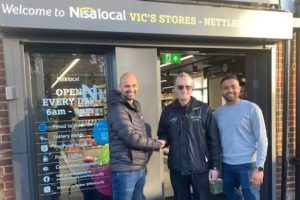Their children, Rhianna and Archie, were aged 12 and nine, “young enough to think of the move as an adventure”, says Pete. The family planned to live next door to the shop to be nearer Iney’s mother, who was living with dementia. Pete would continue in his career as head of retail at wholesaler Palmer and Harvey, while Iney, who had a background in IT training, would take over the running of the 1,100sq ft store with post office in Offenham.
Shopping locally
That was seven years ago and the Penlingtons have survived a succession of setbacks – including lower-than-anticipated sales, two robberies and the closure of Palmer and Harvey, taking with it the store’s main supply source for groceries and Pete Penlington’s job. Today, however, the business is doing well, thanks, say the couple, to a £75,000 renovation of the business this spring. They say a 30% boost in sales because more people were shopping locally during the pandemic gave them the confidence to invest.
Pete, who now works full-time in the business with Iney and six part-time staff, says: “We knew from winning more sales during lockdown there would be demand from the villagers if we got the right range in, with more fresh and chilled, vegan and gluten-free food and a bigger wine range.” Their hunch was right. Since re-opening this April with an accompanying re-brand as a Nisa Local and extended opening hours, sales are up by 46% compared with pre-Covid levels, to a weekly £11,500.
What had been a dated village store has transformed into a modern mini supermarket, with a new EPoS system, counters, flooring, brighter lighting and three times the refrigerated space, from 2.5 metres to 7.5 metres and two double-door freezers instead of one. The improvements have attracted 15% to 20% more footfall and a bigger basket spend, up from £4.45 to £8.62. “That’s quite significant when you consider our numbers were declining for years prior to Covid,” says Pete, who has a career spanning logistics with the RAF, sales at PepsiCo, and a stint as a Woolworths store and area manager.
Larger baskets
With more fresh food, a greater emphasis on premium, and the breadth of the Co-op range, customers now view the store as somewhere to do bigger shops, rather than just an outlet for distress purchases. “Once it was a big deal when our customers spent £25. Now it is a common occurrence,” says Pete, with basket trolleys, brought in with the refit, in constant use. There has been a shift in trade towards the more-lucrative evening hours too. “Previously, most of our business was in the morning with bread, milk and newspapers, but now 40% of our sales are after 5pm, with evening meals and alcohol – including 10-packs of fridge beer and also gluten-free Peroni, which we didn’t do before – selling really well,” says Pete.
The dairy chiller has been one of the biggest beneficiaries of their more-confident approach to ranging, with the likes of halloumi, feta andbrie, together with more ready-meals, pizza and meat now in the chiller. Increasing premium lines has brought higher-spending customers through the door. By listing Delamere goats’ milk, Alpro soya and coconut, Arla lacto-free, Cravendale fresh milk with a longer life and Co-op organic milk, the category has increased in weekly value by £70, as well as helping bring in incremental business. “It is not just the price of the milk we are benefiting from. Customers who didn’t shop with us before are buying other things, so most likely they are in fact generating about £400 in extra business,” says Pete.
Craft beers
The couple have also increased their range of local groceries, which now account for 10% of their turnover. They have doubled the space for artisan cakes and breads from nearby supplier Lawrances’s Bakery, as well as introducing foodie pies such as steak and stilton from Fladbury Pies & Sausages. They already stocked tomatoes, eggs, ham and bacon, in addition to Boat Lane Brewery craft beer from neighbouring businesses. “It has been a massive eye-opener for us,” says Pete. “We were nervous before about making changes and now we wished we had done it years ago.”
But equally importantly, Iney – who admits that for six years she struggled with the decision to relocate – now sees the business as offering a happy future. “It took a while to make friends, as I was so busy working 14-hour days trying to get to grips with suddenly becoming a manager, running a post office and understanding retail,” she says. The thefts from the shop were particularly traumatic. “After the second robbery, I wanted to sell the business,” she says. “It was difficult with our living space being so intertwined with the shop with a connecting door. We spent £12,000 on security to feel less vulnerable at home.”
Bouncing back
Before Covid-19, the shop had struggled to pay its bills for years and in October 2020 Pete was made redundant and the couple lost the security of his income as a director of a bathroom company.
But the good thing was that Pete and Iney could now put all their energy into making a success of the store. They successfully applied for a £50,000 Bounce Back Loan from the government and put in £25,000 of their own money. “If we hadn’t done the work, the store would have gone under in 12 months,” says Pete, who plans to work in the business with Iney for at least another six months to “see how far we can take it”.
Plans include selling plants and introducing two apps: Snappy Shopper for deliveries and Too Good To Go to cut food waste. The couple say they have discovered a new-found enthusiasm for their store and hope to keep it in the family for years to come.
Archie, who is now in sixth form, works there several evenings a week and university student Rhianna is getting to grips with the retail industry with a part-time job at a local supermarket. “The children say they don’t want to go into retailing,” laughs Pete. “But it is nice to think the shop will be here should they need it.”
By Juliet Morrison
 Talking Retail Grocery and product news for independent retailers
Talking Retail Grocery and product news for independent retailers
